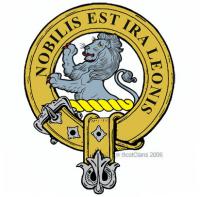
Clan Inglis
Clan Inglis People
Lieutenant General Sir William Inglis, KCB (1764 - 1835)
Senior, much-respected and experienced British officer of the French Revolutionary and Napoleonic Wars who served at several of the heaviest engagements of the Peninsula War. He was wounded numerous times and earned national fame through his order "Die hard 57th, die hard!" to his regiment as he lay seriously wounded behind their ranks at the height of the Battle of Albuera. Thanks to Inglis' leadership, the regiment held and the battle was won and although his wounds nearly proved fatal, Inglis returned to action again two years later to see the war out as a Brigadier. Post-war, Inglis was knighted and served in several military governorships including a spell as Governor of Cork, in which position he died in 1835.
John Inglis, Lord Glencorse (1810 – 1891)
Scottish politician and Judge. He was Lord President of the Court of Session (1867-1891).
Inglis was born in Edinburgh in August 1810. From the University of Glasgow he went to Balliol College, Oxford. He was admitted a member of the Faculty of Advocates in 1835, and in 1852 he was made Solicitor General for Scotland, three months later becoming Lord Advocate, a post he held from May to December of that year. In March 1858 he resumed this office in Lord Derby's second administration, being returned to the House of Commons as member for Stamford. Again his tenure was brief, leaving office in July 1858. He was responsible for the Universities of Scotland Act of 1858, and in the same year he was elevated to the bench as Lord Justice Clerk, with the judicial title Lord Glencorse. In 1867 he was made Lord Justice General of Scotland and Lord President of the Court of Session. He was made a Privy Counsellor in 1859, and awarded a Doctor of Civil Law by the University of Oxford in 1859.
Outside his judicial duties he was responsible for much useful public work, particularly in the department of higher education. In 1869 he was elected Chancellor of the University of Edinburgh against Gladstone, having already been Rector of the University of Aberdeen in 1857 and Rector of the University of Glasgow in 1865. He died in August 1891.
He was President of Scottish Texts Society and published Historical Study of Law 1863.
Elsie Inglis (1864 – 1917)
Scottish doctor and suffragist. She was born in India and given a good education. She studied medicine at the Edinburgh School of Medicine for Women. After founding her own breakaway medical college, she completed her training at the Glasgow Royal Infirmary.
After qualification she was appalled by the standard of care and lack of specialisation in the needs of female patients. When she returned to Edinburgh in 1894 she set up a medical practice with Jessie MacGregor, a fellow student, and also opened a maternity hospital for poor women which was a forerunner of the Elsie Inglis Memorial Hospital. She was a consultant at Bruntsfield Hospital for women and children.
Her dissatisfaction with the standard of medical care available to women led to her becoming politically active and playing an important role in the early years of the Scottish Federation of Women's Suffrage Societies.
Diring the first world war she was instrumental in setting up the Scottish Women's Hospitals for Foreign Service Committee, an organisation funded by the women's suffrage movement with the express aim of providing all female staffed relief hospitals for the Allied war effort. The organisation was active in sending teams to France, Serbia and Russia. She herself went with the teams sent to Serbia where her presence and work in improving hygiene reduced typhus and other epidemics that had been raging there. In 1915 she was captured and repatriated but upon reaching home she began organising funds for a Scottish Women's Hospital team in Russia. She headed the team when it left for Odessa, Russia in 1916 but lasted only a year before she was forced to return to the United Kingdom, suffering from cancer.
She died on 26 November 1917, the day after she arrived back at Newcastle upon Tyne. Her funeral service at St Giles Cathedral in Edinburgh on 29 November was "the occasion of an impressive public tribute", according to The Scotsman. Winston Churchill said of Inglis and her nurses "they will shine in history".





